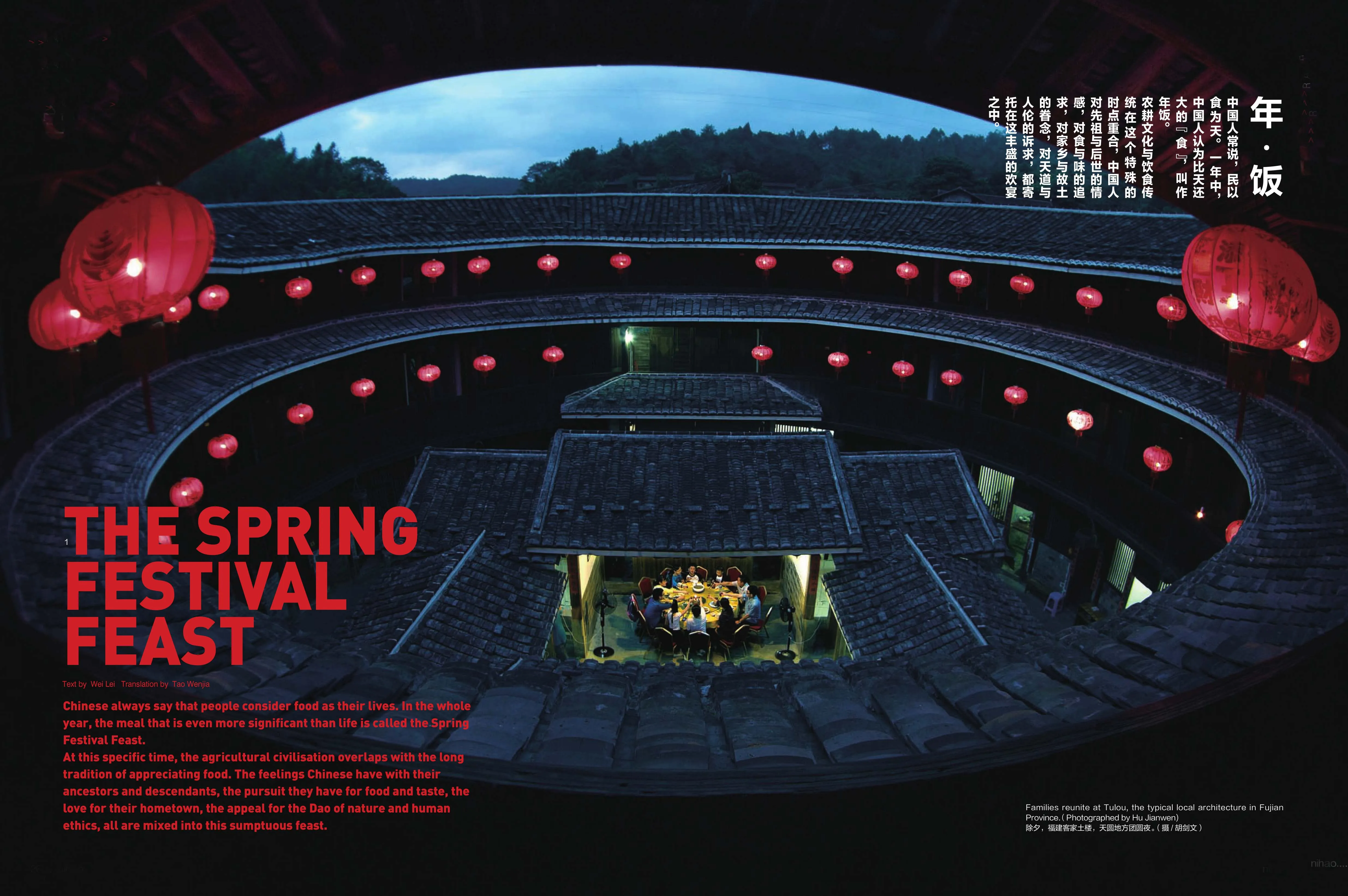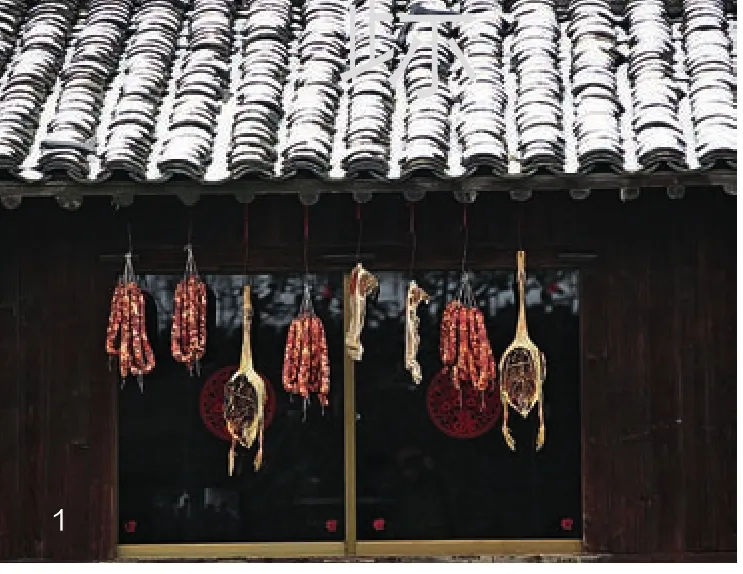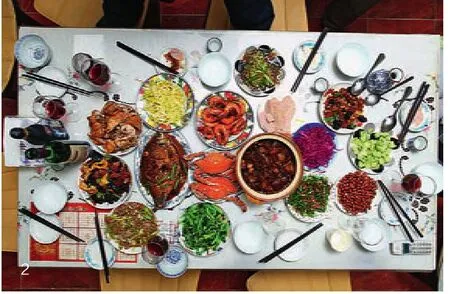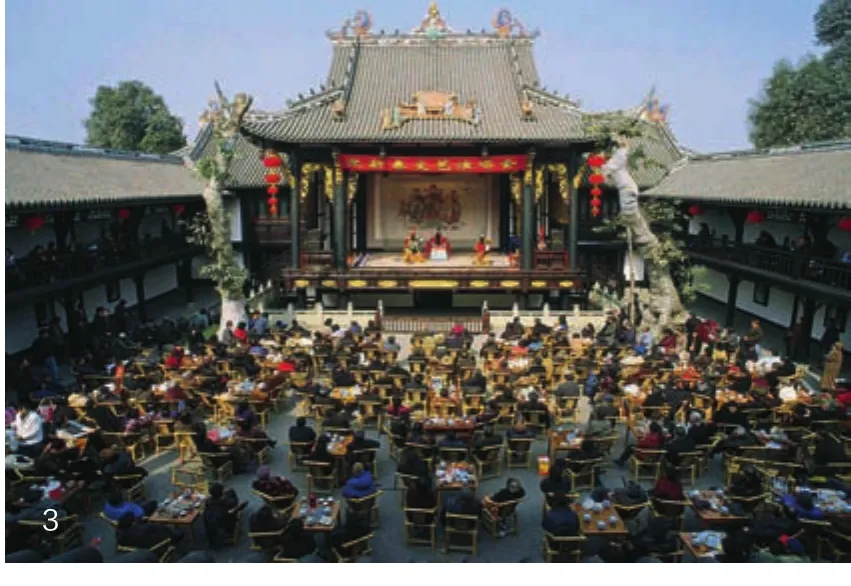年·饭
年·饭
THE SPRING FESTIVAL FEAST
Text by Wei Lei Translation by Tao Wenjia
Chinese always say that people consider food as their lives.In the whole year, the meal that is even more significant than life is called the Spring Festival Feast.
At this specific time, the agricultural civilisation overlaps with the long tradition of appreciating food.The feelings Chinese have with their ancestors and descendants, the pursuit they have for food and taste, the love for their hometown, the appeal for the Dao of nature and human ethics, all are mixed into this sumptuous feast.

Families reunite at Tulou, the typical local architecture in Fujian Province.(Photographed by Hu Jianwen)除夕,福建客家土楼,天圆地方团圆夜。(摄/胡剑文)
中国人常说,民以食为天。一年中,中国人认为比天还大的『食』,叫作年饭。农耕文化与饮食传统在这个特殊的时点重合,中国人对先祖与后世的情感,对食与味的追求,对家乡与故土的眷念,对天道与人伦的诉求,都寄托在这丰盛的欢宴之中。
Meals that are connected to the Spring Festival probably start from December of the Lunar calendar.From this time to New Year's eve, and then to Jan 15th, Spring Festival, the Festival for great food is about one mouth long.Typical dishes are Laba porridge, dumplings, and glutinous rice balls.Other than these, there are unique local foods and traditional snacks all varied in different places.All kinds of foods were put together to become different types of Spring Festival Feasts.
The most important meal of the feast is the New Year's Eve meal.No matter how far you are from home, you must try your best to go back and make it to this meal, only so that you can have an actual Spring Festival.This is the most fundamental wish for the Chinese.The biggest annual human migration in the world - the Spring Festival travel rush - is born because everyone just needs to be back home for this meal.
The New Year's Eve meal represents both the achievements in the past year for the whole family, and luck for the following year.The type of food, prices, and cooking skills are so much more complicated than usual.Most people eat rice for the rest of the year, so on this day they will have rice cake.They may have chicken often, but on this day they have to cook a whole chicken for presentation.
“This is the most special meal of the year, so everyone has to make the most complicated dishes, such as fried lychee.”Xiao Chunlei wrote in the aritical People tried to make the best dishes with their most skilled cooking.Many families start their food preparation a dozen days before the New Year.Some even have to dry fi sh, prepare for different sauces, and make sweet rice wine.The agricultural civilisation has great impact on our nation, so lots of foods that are pronounced similar to the pronunciations of “auspicious”, “richness”,“abundance” will be presented on the New Year's eve dining table.
This meal represents the face and fortune of the whole family, so the duties of preparing this meal are very similar to that of running a family.The most important person in the family will be in charge of preparing dishes, cooking them and hosting the meal.When they present some unusually complicated or expensive dishes, the whole family cheers, and at that time, you can feel the atmosphere of Spring Festival and family most evidently.
China is now no longer in its Agricultural Age, however, the Chinese who kept their thousandyear traditions, are still very emotional and hopeful for both the spring that signals the beginning of agriculture, and the feast to welcome the spring.

1.In Jiaxing city in Zhejiang, people make cured meat.(Photographed by Shen Zhicheng)浙江嘉兴,晒腊味。(摄/沈志成)

2.In Beijing, a family have their dinner for New Year's Eve.(Photographed by Dantou)北京,普通人家的年夜饭。(摄/担头)

3.At the Temple of Marquis in Chengdu city, people drink tea and watch operas to celebrate the coming of new year.(Photographed by Chen Jin)成都武侯祠,人们喝茶、看戏,迎接新年。(摄/陈锦)

4.In Yuncheng City, Shanxi Province,children were setting off fireworks in the courtyard,and delicious dinner that awaits every household.(Photographed by Liu Xiao)山西运城,大人忙着年夜饭,孩子们在院子里玩花炮。(摄/刘潇)
跟过年有关的“饭”,大概从腊月就开始了。从腊八到除夕到十五,跨数十天的春节,也是美食的狂欢节。除了代表性的食物腊八粥、饺子和汤圆,不同地方还有各自的祭祀美食、传统小吃、零食甜品穿插其间,形成一套完整而丰富的“年”食体系。
其中最重要的一餐,是除夕晚上的年夜饭。不管多远,都要尽全力赶回家,吃上这顿团圆饭,才算是真正过上“年”了。这是中国人最基本的愿望,世界每年最大的“迁徙人潮”——春运,也是为赶上这餐饭诞生。
年夜饭,是全家一年成绩的检阅,也是来年全家运势的象征。无论在食材的种类、价格,烹饪的手艺、难度,菜单的制定、顺序,都比平时讲究很多。“天天吃米饭,这时主食就要换成年糕和白粿;你也许经常吃鸡,但这时就要讲求气派,炖只全鸡;一年就这么一餐,什么复杂上什么,比如炸荔枝肉。”作家萧春雷写到。人们争相把公认最好的食物,最复杂的工艺秀出来,很多家庭年前就得储备好够全家人吃十几天的丰富物资,有些地方甚至要提前一两个月开始晒鱼干、腌酱料、做酒酿。农业文明对华夏民族有深远的影响,许多象征物产丰收的,与 “吉祥”“发财”“富余”同音的食材,都是筹备年夜饭的必备。
这餐饭,代表一个家族的脸面和运势。筹备一桌年饭,跟操持一个家,似乎有差不多的责任。负责备菜、掌勺、开席的,通常都是家里最有分量的人。当筹备者端上几道平时不常做费时费工的“传家拿手菜”,或者一些平时吃不到的“豪气大菜”,在全家老小快乐的惊呼和满足笑容中,年与家的感觉,都开始更加强烈起来。
如今,中国已不再是农耕时代,然而,守着千年习俗的人们,对一年农耕开端的“春”与“迎春”之盛宴,依旧满怀情感和希望。

